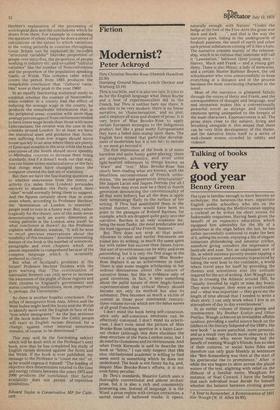Fiction
Modernist?
Peter Ackroyd,
Thru Christine Brooke-Rose (Hamish Hamilton 0.50)
Stamping Ground Maurice Leitch (Secker and Warburg £3.10) Thru is too little, and it is also too late. It tries to do for the English language what Denis Roche and a host of experimentalists did to the French, but Thru is neither here nor there. It also tries to be very modern: there is no linear narrative, no 'characterisation,' and no plot, and it employs all sizes and shapes of prose. It is very brave of Miss Brooke-Rose to apply certain European strategies to the indigenous product, but like a great many Europeanisms they have a faded date-stamp upon them. The English have missed that particular development of modernism but it is too lat,a to imitate it: we must go beyond it.
The first impression of the book is of some harmless and quite funny game-playing: there are anagrams, acrostics, and even some light-hearted references to things known as "trace" and "text." Miss Brooke-Rose has clearly been reading what are known, with the breathless successiveness of French orthodoxies, "the second-generation structuralists" like Jaques Lacan and Jaques Derrida (for all I know, there may even now be a third or fourth generation denouncing the conventionality of all that went before), but all she does is apply their terminology flatly to the surface of her writing. If Thru had assimilated them in the normal manner, there would have been no point to the passages of Roland Barthes, for example, which are dropped quite gaily into the, narrative. Barthes is an easy academic lay, being the most flashy, the most predictable and the least rigorous of the French 'masters.'
But Thru does not stop at that point. Allusions to other and earlier literatures are folded into its writing, in much the same spirit but with rather less success than James Joyce; this sort of inventiveness can be witty and even (astonishing, but it is only the first stage in the icreation of a viable language: Miss BrookeRose displays it as an achievement in itself. There is also some magpie scholarship in her tedious discussions about the nature of narrative linear, but this is evidence only of good intentions. In fact, it says something about the pallid nature of most Anglo-Saxon experimentalism that critical theory should become not only its method but also its substance: Thru becomes as much a victim of content as those poor nineteenth century, three-volume novels which are the boles noires of all good Frenchmen.
I don't mind the book being self-conscious, since only self-conscious emotions can be effectively conveyed, I don't mind its eclecticism, I don't even mind the picture of Miss Brooke-Rose looking sportive in a Saint-Laurent choker (although this does elucidate the deep structure of the Paris-London axis), but I do mind its clumsiness and its obviousness. And when Frank Kermode is said to describe the book as "funny," I can only suspect that this nice, old-fashioned academic is willing to find some merit in something which he does not understand. The book is not funny ha-ha, and, despite Miss Brooke-Rose's efforts, it is not even funny peculiar.
By Thru's standards, Maurice Leitch uses a thoroughly conventional and almost archaic prose, but it is also a rich and consistently interesting one. Instead of language, it is the Word: a prose replete with certain certainties, a sacred vessel of hallowed truths. It opens,
naturally enough, with Nature: "Under the hedge at the foot of the Five-Acre the grass was thick and dark . . .", and that is the way the narrative goes, hiding in the undergrowth of freakish passions, the smell of earth and other such primal substances coming off it like a halo. The narrative consists mainly of the relationship, which is so curious that someone will call it "Lawrentian," between three young men – Harvey, Mack and Frank – and a young girl, Hetty. There is also Minny, a lady of memories, and a certain Master Barbour Brown, the old schoolmaster who tries unsuccessfully to keep everything at a distance and in the process becomes the most convincing character in the novel.
Most of the narrative is glimpsed fitfully through the voices of Hetty and Frank, and the correspondence of thought and language, soul and intonation makes this a conventionally powerful novel as strange and troubled emotions spring unimpeded to the breasts of the main characters. Expressiveness is all. The prose stays close to the subject, living and breathing alongside it: this means that there can be very little development of the theme, and the narrative limits itself to a series of well-chosen scenes crowded by oddity and violence.


































 Previous page
Previous page